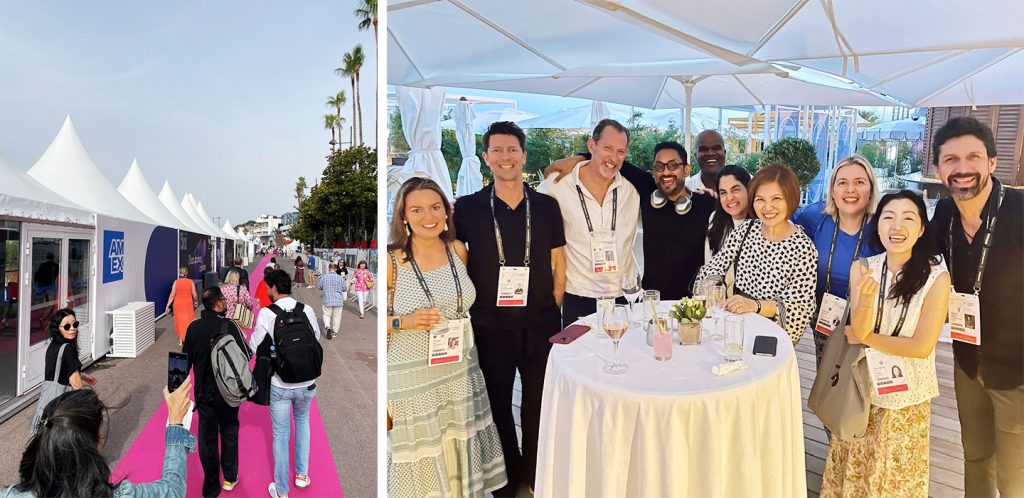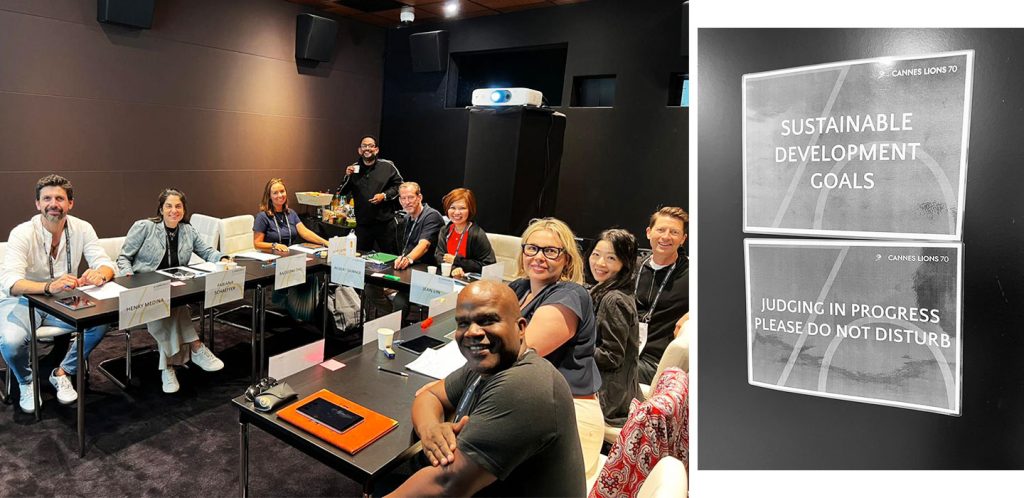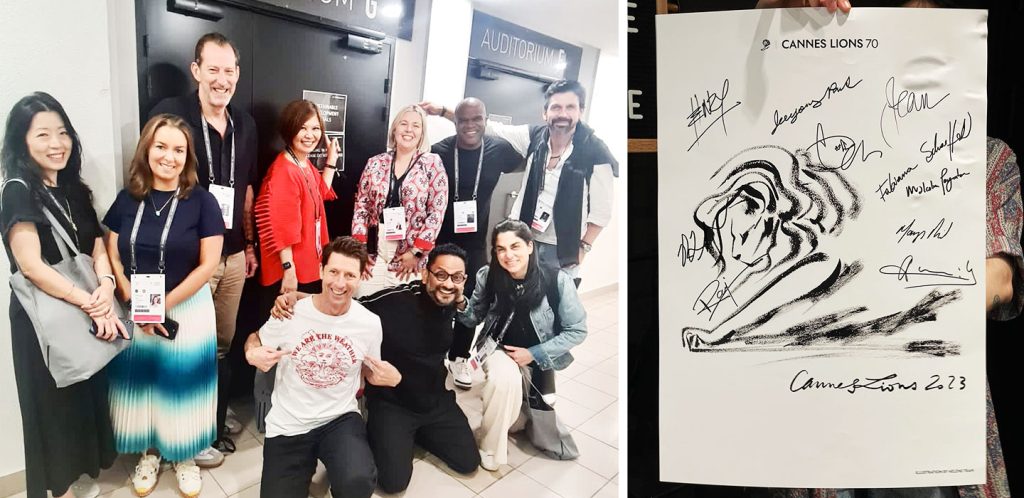CANNES, FRANCE — The Cannes Lions International Festival of Creativity came to a close last June 23, and with its conclusion, the industry now has a new roster of winning works that exemplify creative communications excellence. This includes awardees that marked their Cannes Lions experience with wins under the Sustainability Development Goals category.
Sustainability Development Goals Lions are given to entries that present innovative solutions and initiatives that positively impact the world via creativity. As the industry evolves, more brands and businesses become aware of how crucial it is to incorporate purpose. With the rise of purpose-led work in the world of creative communications, what does it take to not just be an effective initiative but also to stand out as a creative work?
Pulling back the curtains, Cheil Worldwide Global Chief Creative Officer Malcolm Poynton gives a peek into what goes into choosing which campaigns in this category deserve a metal or not. As one of the Sustainability Development Goals jury members, Malcolm lets adobo Magazine in on what gave the winning works the edge, what judges look for in a Lion winner, and how his Cannes Lions experience panned out this year.

adobo: Please tell us about the Sustainability Development Goals Lions. What measurement was the jury using to award a piece of work in this category and how is it different from judging the in the more traditional categories in Cannes? What lens did the jury use?
Malcolm: When it comes to the SDG Lions at Cannes, the work needs to demonstrably contribute to the UN’s Sustainable Development Goals. That’s what the SDGs are all about. So, necessarily, that’s what the results of the creative ideas are measured against.
Of course, this is the Cannes Lions Festival of Creativity so, it’s the creative ideas that are being judged. It’s just that each is judged in the context of how great of an impact they’ve made in relation to the specific SDG [with which] they are aligned.
And they’re being judged by a jury with a slightly wider aperture than other categories. For example, in 2023, the jury featured the UN representative, Rob Skinner, [who was the] Global Chief of Partnerships and Engagement, as well as client and platform-side jurors Isabelle Quevilly, the Creative Shop Director at Meta, and Jeeyoung Park, the Senior VP and Head of Brand & Sustainability initiatives Hanwha Group, alongside agency jurors from both strategy and creative backgrounds.
The breakdown of criteria for SDGs is 20% idea, 20% strategy, 20% execution, 40% impact, and results. Just like any great creative work, the strategy and execution are inseparable from the idea, so it’s the 40% impact that gets more attention than other awards and is what ensures SDG Lions stand apart.

What were the prevailing issues that you notice the industry taking on?
Our industry has a rich history of supporting people-related issues, from homelessness and poverty to hunger. However, the SDGs are bringing the planet and prosperity into sharper focus, embracing more widespread issues related to materials, supply chains, production, and consumption. Big challenges that demand brilliant creative thinking to make a difference. It’s exciting to see how creative agencies and clients are rising to the challenge.
Asia had a few shortlists in this category, we noted Leo Burnett Mumbai Lay’s — “The Biochar Project by Lay’s” (in collaboration with Cropin Bangalore) and “Lay’s Smart Farm.” Can you take us through why this or any other campaign from Asia made the cut?
Lay’s India’s Biochar project really caught the jury’s eye for its counter-intuitive approach to addressing the annual cloak-of-smoke that covers Delhi when farmers burn stubble from crops to speed their planting cycle. Partnering with The Punjab Agricultural University and Leo Burnett, Lay’s created a unique, low-cost incomplete-combustion kiln to burn the stubble with 50% less smoke emissions and deliver the added benefit of bio-char, a carbon-rich soil amendment that reduces the dependency on chemical fertilizers. It’s a triple win – kilns made for little cost from materials on the land, 50% less smoke emissions, and a truckload of carbon-rich biochar to enrich the soil. This really shows Lay’s commitment to the role they play further up the chain, rather than washing their hands of their sourcing of materials.
However, like a couple of other SDG Silver Lion winners such as Cheil x Samsung’s “UNFEAR,” the handbrake that slowed Biochar’s journey to Gold was in the scale and deployment to date. There’s no question the jury could see Biochar has the potential to scale and the potential to even be deployed in other countries however, as a pilot project it fell short of the results necessary to reach the top.
It’s exciting and inspiring to see what rose to the top of the SDG Lions and landed the Grand Prix. Tell us more about the campaign that won and why?
When it comes to SDG Lions, as a jury we had discussed what focus we felt would inspire more brands to do their bit. For the most part, by design, NGOs need little encouragement. However, we felt so much more can be achieved if we can inspire brands to take the lead in more meaningful and committed ways.
We were impressed by the efforts of several brands, from Nikkei’s “Well-being Index” to SC Johnson’s “Certified Care,” Samsung’s “UNFEAR,” and Lay’s Biochar project. However, it was Mastercard’s “Where to Settle” that won the day. An app that aggregates Polish POS data with Tax data, real estate, and job search data to give Ukrainian refugees a clear picture of where exactly they may find the best opportunities when migrating to Poland. Developed and deployed in a super-compressed time frame, to date the app has been used by over 25% of Ukrainian refugees crossing the border and is helping Poland’s positive GDP growth resulting from the influx of Ukrainian refugees. It’s a great case of strategy, idea, and execution resulting in real results from a brand whose values are demonstrably aligned with the SDGs.

Also worth special mention here is the not-for-profit case that was not eligible for the Grand Prix. The SDG jury was unanimous in their applause for Solar Impulse’s “Prêt á Voter” – a book sent in June 2022 to the newly elected French Assembly and Senate politicians containing 50 fully researched and legally complete planet-positive legislative proposals, ready to be proposed and voted on immediately. Since its launch, laws have been adopted in France on Geothermal Energy, Floating Solar Panels, and Sustainable Agricultural Energy with a further nine laws under review.
What was your Cannes Lions experience like this year?
Now that Cannes 2023 is over, it’s safe to say it’s back to the best of years gone by. Attendance was up, entries were up, the Young Lions competition delivered some inspiring winners, and the big topic was AI (as everyone expected). APAC won some major awards with The Monkeys Australia taking out the Titanium Grand Prix for First Digital Nation and Cheil Worldwide Seoul taking home the Glass Lion Grand Prix for “Knock Knock: A Silent Emergency Call.”
In short, Cannes 2023 was as inspiring, exhausting, and rewarding as ever. Congrats to all who won Lions – it’s a huge achievement and, win or not, a huge inspiration for what more we can do before 2024. I can’t wait!










